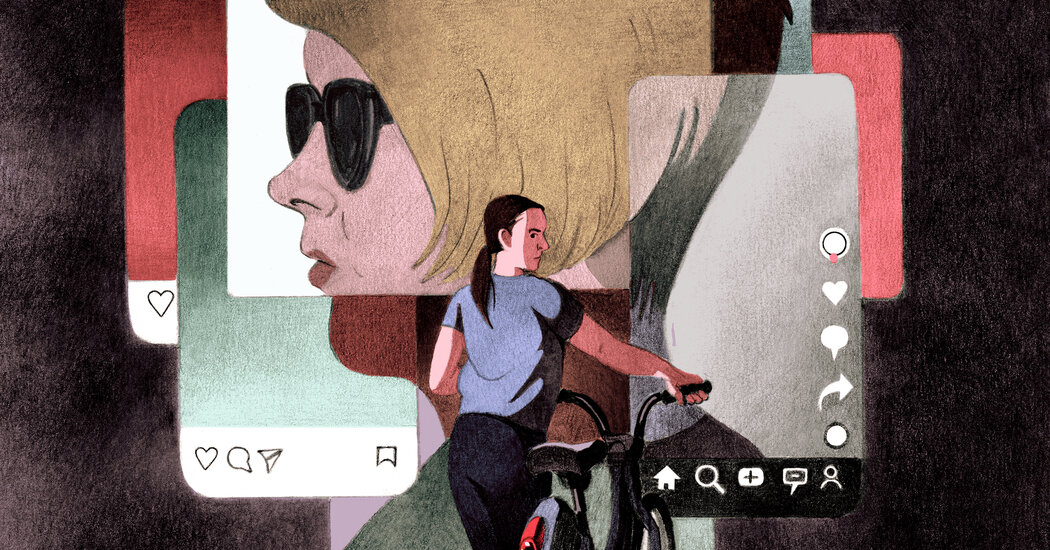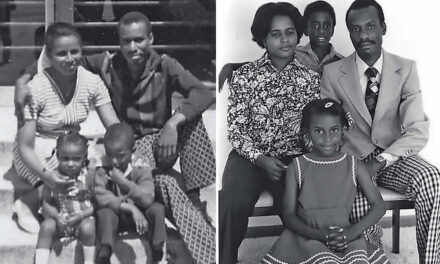
Sarah Comrie is a 34-year-old physician assistant from San Diego. After getting a master’s degree from Cornell, she took a job at Bellevue, a public hospital in New York that serves many people that the city’s for-profit hospitals might decline to treat, including the uninsured, the homeless and members of the Rikers Island jail population. In 2020, she was profiled by The Times as one of the workers who risked their health to care for others during the pandemic.
Today Comrie’s life has been turned upside down. She has been doxxed and faced death threats. Bellevue placed her on leave. She had to hire a lawyer. She is widely known, as a result of a viral video in which she appeared in May, as Citi Bike Karen.
Now that the heat of the moment has passed — and after most people who watched the video have probably forgotten it — we would be well served to pause and reflect on what happened before, during and in the aftermath of that brief incident and consider the consequences for the participants. For the sake of the rest of us, we should also think about how we interpret and process the internet flare-ups that momentarily grab our eyeballs and emotions. We should pay attention to the fallout.
Here is what we know for certain about the episode that engulfed Comrie. A 90-second video of a dispute over a rental bike between Comrie, who is white, and a Black teenager was filmed on May 12 and then posted online, ultimately attracting tens of millions of viewers on Twitter, TikTok and other platforms. In the video, Comrie, wearing hospital scrubs, is straddling a bike and a young man is holding it with one hand near the handlebars. Their bodies are slightly intertwined. Comrie, in an aggravated-sounding tone, calls for help several times. The young man, with an exasperated-sounding chuckle, says, “This is not your bike.”
There is cross talk and laughter among him and his friends. At one point, Comrie moves as if to steer the bike away. The young man maintains his hold on the bike. “Get off me, dude,” she says.
Comrie grabs one of the young men’s phones. “Why you took his phone?” a voice says off-camera, and she seems to hand it back as he grabs it from her.
“You’re hurting my fetus,” she continues, evidently referring to the way in which the arm of the young man is in contact with her abdomen. “I’m not touching you,” he replies. “You’re putting your stomach on my hand.”
A man in hospital scrubs approaches to intervene. Comrie appears to cry briefly — one of the young men accuses her of pretending (“She’s fake-crying. Stop fake-crying”) — and then she steps away from the bike. One of the other young men says, “Your baby going to come out retarded.” The video ends shortly thereafter.
Without knowing what transpired before the footage began, it’s easy to leap to a judgment about what you’re seeing, depending on your biases. If you view the episode through the lens of sex alone, you might draw one conclusion: A pregnant woman was harassed by a group of teenage boys who wanted her bike. Viewed strictly through the lens of race, a white woman took a bike from a group of Black kids, then tried to get them in trouble.
But crucial questions remain: Did the rental bike belong to the young man, in which case Comrie was in the wrong, inflaming the situation by calling for help — dangerously so, given the charged racial context of a white woman making accusations against a Black man? Did the bike belong to Comrie, in which case the young man was in the wrong, inflaming the situation by bullying and mocking a pregnant woman with his friends? Was Comrie maliciously faking her distress or was she genuinely panicked and upset?
Many who watched the video were certain of what they saw. The civil rights attorney Ben Crump, in a subsequently deleted post on Twitter, accused Comrie of attempting to steal the bike and called her behavior “unacceptable,” an example of “the type of behavior that has endangered so many Black men in the past.” The website Anti-Racism Daily accused Comrie of trying to “weaponize her tears.” The Miami Times called her “an aggressive woman.” Tariq Nasheed, a filmmaker and social media personality, called her “a suspected white supremacist.” A blog post on the website Daily Kos said she “weaponized her whiteness over a stupid bikeride.” NYC Health + Hospitals, the network that includes Bellevue, issued a statement to CBS News describing the video as “disturbing.” A local NBC News affiliate sent a camera crew to Comrie’s apartment.
Several news sites ran headlines calling Comrie the “Citi Bike Karen,” using a slur for a white woman (the kind who, according to one story in The Times, roams stores and restaurants “spewing venom and calling the authorities to tattle, usually on people of color and often putting them in dangerous situations”).
No witnesses have come forward with accounts that vindicate either side in the incident. Nobody other than the people involved knows for sure what happened. Most people who saw the video have presumably moved on.
But given the grave consequences she suffered, Comrie, who recently spoke to me in her first public comments since the incident, hasn’t had the luxury of moving on or forgetting. As for the young men, their identities have not been confirmed — despite my attempts to track them down and reach them — which may have spared them direct racist attacks and reprisals. But surely, they haven’t benefited either from being vilified by uninformed commenters online.
Can we get any clarity on what transpired? Let’s take each side’s story in turn.
On May 12, Comrie told me, she left the hospital after a 12-and-a-half-hour shift. On doctor’s orders because of a uterine condition, she had been making use of the e-bikes from New York’s popular Citi Bike ridesharing program rather than using the regular rental bicycles. She saw on her Citi Bike app that several e-bikes were free a few blocks away, so she took a regular bike from a nearby docking station and headed over to switch.
When she got there, she said, she asked a boy leaning on one bike if that bike was taken and he said yes; she then straddled a bike next to him and scanned its QR code. Her Citi Bike receipts show she took it out at 7:24 p.m. The bike released, she said, and she put her phone away.
“Hey, that’s my bike,” she heard someone call out, she said. She looked up and saw a group of teenagers surrounding her, insisting, “That’s our bike.” She explained that she had just rented it.
One of the teenagers, Comrie said, told her to get off the bike; the others started hassling and cursing at her. According to her, several of them then put their hands on the bike and shoved it back into the docking station, which automatically relocked it. Now it was a free bike again, and one of the young men blocked her from re-scanning it, using his own phone to claim the bike.
At this point, Comrie said, she began to yell for help. That’s when one teenager began recording the altercation on his phone.
What is the teenagers’ version of the incident? I have only an account purported to be from one of the young men and his mother, who anonymously offered a different version of the events. According to this account, as told to one website, the teenagers were holding on to Citi Bikes that they had docked briefly — to avoid the rate increases that set in after 45 minutes of use — before taking them out again. The young man says Comrie asked two other boys in the group if she could take a bike, citing her pregnancy and they both declined. He says she then asked him, and he apologized but explained he needed the bike to get home; he says she then tried to take the bike herself from under him.
The Citi Bike receipts he apparently offered to one website show he took the bike out at 7:25 p.m.
Having examined both sets of receipts, I’m inclined to believe Comrie. After all, why would she check out a bike at 7:24 p.m., immediately change her mind and return it one minute later — and then change her mind again and pick a fight with a group of teenagers to get that bike back? It’s possible but it seems unlikely. An alternative is that she checked out the bike and that it was forced back into the lock against her will, then checked out by the teenager a minute later — which would be consistent with her narrative.
Again, no one who wasn’t there knows for sure what happened. And I’m aware that had I spoken with the teenagers, they may have presented me with facts I’m unaware of. It is entirely possible that I’ve missed something. Whatever took place between her and the teenagers, a few minutes afterward, the teenager got the bike he wanted and Comrie, by her own account, took out another e-bike that had been returned during the fracas. No police were involved. The two parties haven’t spoken to or seen each other since.
What I do know for sure is that nothing in this episode justifies what has happened to Comrie after the video went viral and the incident took on a life of its own.
And there’s something else I know for sure: Once publicly labeled a “Karen,” Comrie was placed in a no-win situation. There is no doubt that the violent history of white people making false accusations against Black people should give anyone pause when making an accusation against a group of Black teenagers.
But it cannot be the case, morally or logically, that it’s impossible for a white woman to have a justifiable complaint and impermissible for her to speak up if she thinks she’s been wronged. Yet that is what the term “Karen” implies: that if you are a white woman, your relative privilege renders suspect any complaint you might have; if you try to defend yourself, you thereby prove the case against you.
The same goes true for any woman who, whether out of female solidarity or because she believes an individual doesn’t deserve the slur, speaks up on behalf of a named “Karen.” To give the benefit of the doubt to the accused, let alone to defend her, is to become a Karen by association. When the head of diversity at Uber, Bo Young Lee, convened a forum called “Don’t Call Me Karen,” for an “open and honest conversation about race,” some employees complained on Slack, and one Black employee later suggested at an employee town hall that those types of conversations were “tone-deaf, offensive and triggering.” Uber suspended Lee.
The choice for a white woman is stark: either not to have any complaints or to shut up about those that you do. This is a far cry from the lessons of the women’s movement, the #MeToo movement and a basic sense of justice.
The Karen trope reflects a pervasive strain of misogyny in our culture. “Karen has become synonymous with woman among those who consider woman an insult,” Helen Lewis wrote in The Atlantic in a detailed anatomy of the slur. The journalist Nina Burleigh has also observed the term’s distinct tilt toward white women over 40, long a punching bag in popular culture: “White middle-class women of a certain age are among the last groups one can hurl targeted abuse online without being canceled.” Moreover, she writes, “the fact is, it has never been politically incorrect to trash women as women — that is, women who cannot also claim to belong to another disadvantaged group by virtue of race, body weight, sexual preference or disability.”
No one, whatever their sex, race or age, deserves to be reduced to a negative stereotype. When people — men or women, Black or white or of any other ethnicity — do bad things, they do them as individuals, not as representatives of a demographic group.
“It’s so disappointing to me,” Comrie told me, reflecting on the entire episode. “The event that initiated this is like a playground argument taken out of context, that in light of our world and social media has been made political and racial.”
In the rush to judgment — whether because it fits a ready narrative, satisfies a social-media-fueled rage or seems justified in the moment — few stop to consider that the target of their fury may have a full and complicated life like anyone else, whether adult or teenager, public figure or private individual. People make mistakes. A merciless indictment and trial without a jury by an online mob is far beyond what most human beings should be expected to weather.
On May 12, a woman was recorded in an altercation over a rental bike. She may have tried to get the teenagers in trouble — in which case those young men deserve an apology, at the very least — or she may have been the victim of bullying. But whatever the case, the consequences for her were far out of proportion for a petty tussle over a bike. And whatever happened on May 12, the woman involved has a name. Neither Sarah Comrie nor any other woman whose name isn’t Karen should ever be called a Karen.
The Times is committed to publishing a diversity of letters to the editor. We’d like to hear what you think about this or any of our articles. Here are some tips. And here’s our email: letters@nytimes.com.
Follow The New York Times Opinion section on Facebook, Twitter (@NYTopinion) and Instagram.




